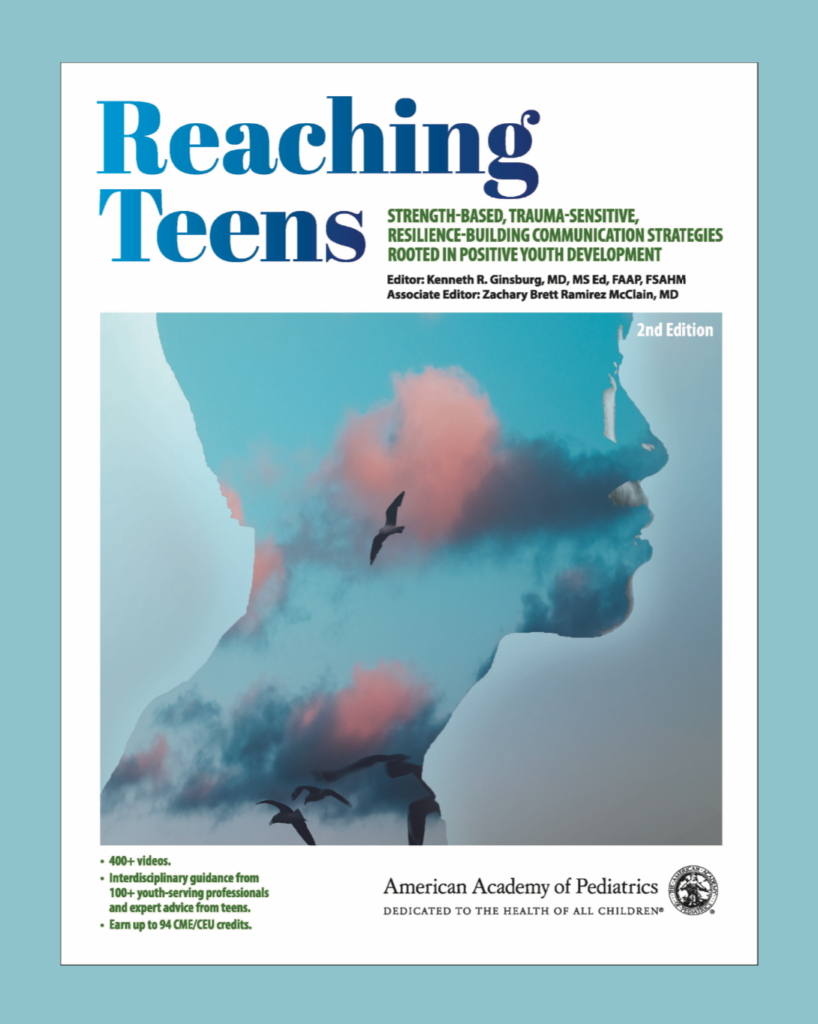The second edition of Reaching Teens from the AAP features quotes from MyVoice, in a chapter titled “The Traumatic Impact of Racism and Discrimination on Young People and How to Talk About It.”
 As Americans of all ages protest systemic racism in policing, many adults in our country are struggling to make sense of race and racism. Maybe they should’ve asked youth. A new book from the American Academy of Pediatrics did just that, partnering with MyVoice to include data from youth across the United States who responded to MyVoice’s text message survey questions on race and racism
As Americans of all ages protest systemic racism in policing, many adults in our country are struggling to make sense of race and racism. Maybe they should’ve asked youth. A new book from the American Academy of Pediatrics did just that, partnering with MyVoice to include data from youth across the United States who responded to MyVoice’s text message survey questions on race and racism
Reaching Teens: Strength-Based, Trauma-Sensitive, Resilience-Building Communication Strategies Rooted in Positive Youth Development is the AAP’s updated second edition, which will be published later this summer. Text message responses from youth appear prominently in a chapter on “The Traumatic Impact of Racism and Discrimination on Young People and How to Talk About It.”
Through direct quotes of MyVoice participants, the book shares youth lived experiences of race, racism, power and privilege. The quotes serve as an honest and personal counterweight to the chapter’s larger discussion of how experts define racism and how it works to undermine youth development and well being. The chapter includes a glossary of oppression terms, explanation of microaggressions, and guidance for adolescent health advocates, doctors, teachers, and other youth workers on how to explore identity, address race-based trauma, and support youth in their development.
The book will be published at the end of this month, but we have early, free access to the chapter to share with you: Download “The Traumatic Impact of Racism and Discrimination on Young People and How to Talk About It.”
On the team of authors for the new edition, Veenod Chulani, MD, MS Ed, FAAP, FSAHM stated:
“I feel deeply indebted to the youth and young adults who shared their race-related views and experiences through MyVoice. Their voices clearly speak to how racism directly and vicariously impacts their identity development, lived experiences, and health and wellbeing.”
Dr. Chulani is a pediatrician who specializes in adolescent medicine. He leads the Phoenix Children’s Adolescent Medicine Program and Medical Director of the Gender Support Service. His primary areas of interest include the care of LGBTQ youth, health equity promotion, and diversity and inclusion. He is a member of the Society for Adolescent Health and Medicine’s Diversity Committee and served as co-author for the organization’s positions, Promoting Equity and Reducing Health Disparities Among Racially/Ethnically Diverse Adolescents (2013) and Racism and Its Harmful Effects on Nondominant Racial-Ethnic Youth and Youth-Serving Providers: A Call to Action for Organizational Change (2018).
Dr. Chulani co-authored the chapter with Maria Veronica Svetaz, MD, MPH, FSAHM, FAAFP; Tamera Coyne-Beasley, MD, MPH, FAAP, FSAHM Maria Trent, MD, MPH, FAAP, FSAHM; Roy Wade Jr, MD, PhD, MPH, MSHP; Michael Howard Ryan, MS, LPC; and Michele Kelley, ScD, MSW, MA
Are you a participant in MyVoice who has thoughts on the chapter or ideas for Dr. Chulani? Or did you read the chapter and have other ideas for conversation on race, racism, and youth wellbeing? Sign up for MyVoice or drop us a line at hear.my.voice@umich.edu
